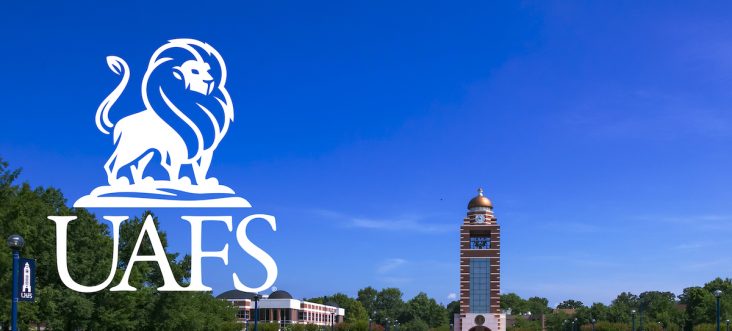UAFS plans to end five academic programs
by February 16, 2024 8:30 am 939 views

The University of Arkansas at Fort Smith (UAFS) may soon eliminate some non-viable academic programs. Poor graduation rates and declining enrollment in the programs are behind the planned move.
UAFS Chancellor Dr. Terisa Riley sent emails to faculty and students Thursday (Feb. 15) advising that after thorough review in coordination with the Arkansas Higher Education Coordinating Board, the university intends to recommend to the University of Arkansas Board of Trustees five academic programs and majors deemed non-viable to be eliminated. The recommendations are expected to be presented to the UA board in March, Riley said in an email to the faculty.
“Responsible academic leaders understand that universities must constantly review curriculum, programs, and degree offerings in order to stay relevant with student and employer demands. It is particularly timely to review programs and recommend elimination of those with low enrollment based on the savings that will provide for the campus. The savings is necessary as we grapple with the same types of budget shortfalls as most regional, public universities in the country. In five years, we estimate that the savings for these five programs will be over $500,000 per year,” Riley said.
The programs to be cut include:
• Computer-Aided Design – associate of applied science degree and related certificates;
• General Technology Automotive Concentration – associate of applied science degree and related certificates;
• Political Science – bachelor of arts degree (the political science minor will remain);
• Spanish – bachelor of arts (the Spanish minor and certificate of proficiency will remain); and
• Theater – bachelor of arts (the theater minor will remain).
“This recommendation comes after comprehensive program reviews conducted by both the Arkansas Higher Education Coordinating Board and our internal academic program viability task force, which considered, among other factors, unsustainable graduation rates and unfavorable enrollment trends,” Riley said in the email.
The Arkansas Higher Education Coordinating Board is required to review existing academic programs offered by public colleges and universities in Arkansas under state law, Riley said.
Additional institutional-level program reviews are required to take place on set schedules, with guidance from the AHECB indicating that universities should review programs annually to ensure the efficient use of resources and the preparation of students for success post-graduation.
“This regular evaluation of academic programs is a fundamental responsibility of our university’s work, and one that underscores our commitment to effective and transparent resource management – a core component of the UAFS Strategic Plan,” said Rachel Putman, UAFS director of communications.
Non-viable programs are identified through low graduation rates and enrollment trends that indicate graduation rates will continue to stay below the AHECB threshold of six graduates per year (four for select STEM programs,) she said. In fall, spring, and summer of 2023, these five programs combined awarded just 23 associate and bachelor’s degrees. There are 75 UAFS students enrolled in these programs at any level, with an additional 33 high school students enrolled through the Western Arkansas Technical Center (WATC.)
Enrollment in the CAD and Automotive Technology programs has trended downward for the past several years, Putman said. Although there are certainly employment opportunities in these areas, she said it is often not necessary for individuals to complete academic training or earn an academic credential to secure employment. Individuals hoping to attain these jobs often acquire skills through high school course work, self-teaching, and/or employer-facilitated training.
Riley said it was important to remember that though the university will recommend elimination of these degree programs, recommendations will not be finalized until the proposal receives approval from the University of Arkansas System Board of Trustees. Should the Board of Trustees approve this plan, all degree programs will be taught out on campus to ensure enrolled students are able to earn their credentials at UAFS. All of the students will be permitted to complete their degrees on schedule, and actual program end dates will range from one to three years depending on enrolled populations, Putman said.
Though these programs have not seen strong enrollment, UAFS new student enrollment was up almost 7% and total enrollment was up 2.5% in the fall. Top programs include bachelor’s of business administration, bachelor of science in nursing, bachelor of science in organizational leadership, bachelor of science in biology, bachelor of science in computer science, bachelor of arts in psychology, and bachelor of science in elementary education.
Riley said UAFS is “incredibly strong financially and in our robust academic offerings.” She said that through intentional and careful stewardship, the university ended FY23 with 269 days of cash on hand, which exceeds the recommended standard of 180 days. The university was able to reallocate annual operating funds to support current academic programs as well as invest in new strategic priorities, she said.
In the email to faculty, Riley said the three faculty members affected by the proposed drop of programs were informed of necessary contract changes, with the non-renewal of a one-year contract and two contracts with modifications to expire in 2025.
“These are the only contracts we anticipate being impacted by these proposed program and major eliminations in FY24 and FY25,” the email noted.
